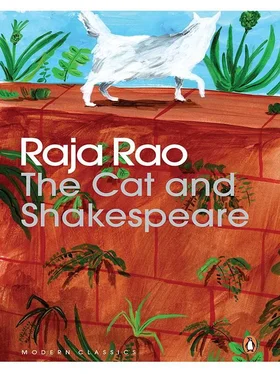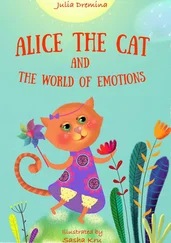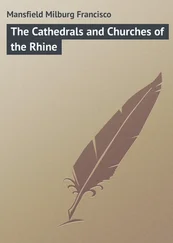Rao Raja - The Cat and Shakespeare
Здесь есть возможность читать онлайн «Rao Raja - The Cat and Shakespeare» весь текст электронной книги совершенно бесплатно (целиком полную версию без сокращений). В некоторых случаях можно слушать аудио, скачать через торрент в формате fb2 и присутствует краткое содержание. Год выпуска: 2014, Издательство: Penguin, Жанр: Современная проза, на английском языке. Описание произведения, (предисловие) а так же отзывы посетителей доступны на портале библиотеки ЛибКат.
- Название:The Cat and Shakespeare
- Автор:
- Издательство:Penguin
- Жанр:
- Год:2014
- ISBN:нет данных
- Рейтинг книги:4 / 5. Голосов: 1
-
Избранное:Добавить в избранное
- Отзывы:
-
Ваша оценка:
- 80
- 1
- 2
- 3
- 4
- 5
The Cat and Shakespeare: краткое содержание, описание и аннотация
Предлагаем к чтению аннотацию, описание, краткое содержание или предисловие (зависит от того, что написал сам автор книги «The Cat and Shakespeare»). Если вы не нашли необходимую информацию о книге — напишите в комментариях, мы постараемся отыскать её.
The Cat and Shakespeare — читать онлайн бесплатно полную книгу (весь текст) целиком
Ниже представлен текст книги, разбитый по страницам. Система сохранения места последней прочитанной страницы, позволяет с удобством читать онлайн бесплатно книгу «The Cat and Shakespeare», без необходимости каждый раз заново искать на чём Вы остановились. Поставьте закладку, и сможете в любой момент перейти на страницу, на которой закончили чтение.
Интервал:
Закладка:
Govindan Nair jumped across the wall and went to the National Typewriting Institute near the Post Office. Meanwhile the Mudali told me of his wife’s grandmother in Madurai who was a great lady and a beauty. They said she could stop a flood with a mantra, such were her looks. She spoke to the Goddess as if she had known her always. She spoke in classical Tamil. In some past life, so astrologers said, she was born a princess and was married off to the Chiefs of Madurai. She walked in the palace as if she knew all of it. From that came their love of houses. The grandmother and her spouse built and built everywhere in Madras, in Mysore, even in Ootacamund. The Mudali and his wife had no grandchildren, although their daughter had done every pilgrimage. She was thirty-seven and no children came. They never made a false statement; they always took seventeen per cent interest. Even so, no child came, and no dream came to make the child come. Sadhus had blessed, and some had even given coconuts with mantras. Nothing happened even after these many holy acts. Well, sir, that is as the Lord Subramanya wishes.
The National Typewriting Institute has a very good reputation for job work. How clear the document was. It made your heart shine gold, such was the excellence of the typing. I put my signature: Ramakrishna Pai. S. Ramakrishna Pai. Then Govindan Nair signed as witness. Usha drew an Om, and Govindan Nair certified her signature. Murugan Mudali carefully shaped his signature, and somehow wept. He just did not know. Tangamma handed over to Usha betel leaves and coconut, and even tobacco to chew. She ran back as Shridhar was in some sort of delirium. The doctor had promised to come at three. Govindan Nair went home and ran back quickly. I entered my room and brought out his seven thousand rupees. Usha handed the money to Murugan Mudali. Within ten months the rest of the money would be paid, in two instalments. The house became mine — I mean Usha’s. Murugan Mudali (he was about fifty-five) began to smile, and seemed almost happy now. He took Usha on his lap. Then he lifted her up to his arm. ‘What a sweet child,’ he said, and stood up. Govindan Nair said: ‘She is the true owner.’
‘Permit me, sir,’ said Murugan Mudali, ‘permit me to take the child home. I want my wife and daughter to see her. May I keep her till the afternoon?’
‘Of course.’
‘But Shridhar is ill. I want to see him,’ said Usha. The children had build little stone stands from which they spoke to each other across the wall.
‘Shridhar will be well. The doctor is coming,’ Govindan Nair assured her.
The Mudali took the child in his arms and, smiling to himself, closed the garden door. Usha was going to see Grandmother. Was she beautiful? Will she give me glass bangles? Will she take me to the temple? ‘Grandfather,’ she said, ‘will you take me to the temple just once?’
‘Why, we’ll go now. We’ll go home and take Grandmother. We’ll go to the temple,’ he said.
How beautiful the god was you will never never know. The god lay on his seven-headed serpent. His one wife at the feet and another rising from his lotus navel — blue he lay and in deep sleep. Grandfather wept profusely. One weeps in temples. Grandfather and Grandmother went then to Chalai Bazaar and bought Usha two ankle bands of silver. She looked so lovely she wanted to go back to the temple.
There’s only one depth and one extensivity and that’s (in) oneself. It’s like a kitten on a garden wall. It’s like the clock of the Secretariat seen through a mist of clouds — time moves on according to a moon (and the sun) but the offices go on working, people scribbling, smoking, typing, belching, scratching, farting big, fibbing, exuding asafoetida perspiration or the acrid smell of buttermilk — there will be peons to whom a rupee warrants well, but two warrant more, and up the staircase you go, one, two, and three, and each step is worth a rupee, on to the first floor. On the second floor the prices are higher. You pay ten rupees a step. And on the third, it’s like offerings to the Maharaja, you pay according to ceremony. And above it all sits time like a nether world recorder asking no questions. It revolves on itself and when the hour comes it strikes. And off it goes — something. What is it that is gone? What is time? What is death? In fact you could ask what is life. You issue a ration card. Your house number, numbers of the family, are all indicated: you are class A, B, C or D. You buy what you want and when you want, but only what is available. Governments are notoriously mismanaged. A railway car might have gone off to Coimbatore containing rice for Cannanore or Conjeevaram. What matters is that the station begins with a C. Cannanore, Conjeevaram, Coimbatore. It would almost make a nice mantra. Life is only such a mantra — you go on saying life life, or in Sanskrit jeeva jeeva (and in Sanskrit it sounds more real), so you go on living. Jeeva is life. So I live. There is a clock tower. Then there is the ration shop. Ration Office No. 66 is just above it. The Revenue Board is under the clock tower, and that is where I work. Down the road that goes to the hospital is Ration Office No. 66. That is where Govindan Nair works. His face is full now. I have a house. I have laid the foundation for myself — and through time. The Secretariat clock will go on chiming forever, and as long as it chimes, it will go on telling you the time forever; can you imagine a state without a government? You must have permanence. So permanence is the Secretariat with the clock tower. I hear the clock chime at night from my house. Thus I live a bit of eternity. My house has a garden wall. There is, as you know, a bilva tree by the wall. A hunter once broke twigs off the bilva, you will remember, and down the leaves fell on the oval emergence of the alabaster. Shiva was pleased with this unknowing worship. I look towards the garden wall. Lord, I am not even a hunter that in his nervousness lets down bilva leaves. Lord, what hope is there for me?
Govindan Nair always appears at such a moment. These are the sort of thoughts that run through me in the morning. I usually wash my face and feet. Then I go to the Home Friends for my coffee and upma. By the time I return the Malayalarajyam is on my veranda. I read it from beginning to end, about Hitler and the wars, Churchill and the speeches, and then I begin to scratch the curve of my feet. I have a house now, my own. Usha is lying inside. She will wake soon and say, ‘Father.’ What a mysterious word it is. ‘Father,’ she says. As if I were able to be the cause of anything. For father simply means cause of her. And the cause of cause, what is it? Is it not she? Could there be a father without a daughter? What would Usha be without me? What would this house be if I did not own it? It is not possible not to own it and yet it would somehow be mine? Air I own not, yet I breathe. I breathe myself. Do I own I?
Such are the terrible thoughts that oppress me. Govindan Nair is my guide. He lives across the wall, and the bilva spreads like a holy umbrella above him. It gives him spiritual status.
So Govindan Nair comes and says: ‘Mister, I am in grave trouble.’
‘What?’ I ask.
‘My son is seriously ill.’
‘What illness? For days he’s had no fever.’
‘Shantha is there. She will tell you.’
‘But what is it?’
‘It’s called fever. But it might any day be called pneumonia.’
‘How did it come?’
‘Just as its name came. From somewhere. He was convalescent. He played in the rain planting roses. He got wet. Then he came here and stood talking to Usha across the wall. So you could say Usha gave it to him.’
‘What?’
‘Since you want a cause, anything is the cause. The more innocent a thing, the more mysterious its cause. You wear a Gandhi cap — a two-anna piece of one-foot cloth that any man can put on his pate, and not even what his irreverent bladder empties could be held in the cap’s depth, such its size — yet you could get arrested for anti-British activity. Innocence is the most dangerous thing in the world. So Usha is the cause of Shridhar’s illness.’
Читать дальшеИнтервал:
Закладка:
Похожие книги на «The Cat and Shakespeare»
Представляем Вашему вниманию похожие книги на «The Cat and Shakespeare» списком для выбора. Мы отобрали схожую по названию и смыслу литературу в надежде предоставить читателям больше вариантов отыскать новые, интересные, ещё непрочитанные произведения.
Обсуждение, отзывы о книге «The Cat and Shakespeare» и просто собственные мнения читателей. Оставьте ваши комментарии, напишите, что Вы думаете о произведении, его смысле или главных героях. Укажите что конкретно понравилось, а что нет, и почему Вы так считаете.












